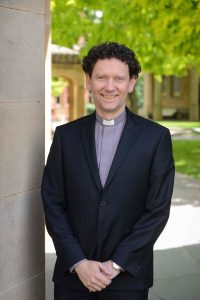 In one of my favourite films, Back to the Future III, Michael J Fox’s character Marty McFly wields the Colt “Peacemaker” revolver in a duel with his arch nemesis. The beauty of this film, of course, is that Marty finds a way to win, which doesn’t involve shooting the baddie.
In one of my favourite films, Back to the Future III, Michael J Fox’s character Marty McFly wields the Colt “Peacemaker” revolver in a duel with his arch nemesis. The beauty of this film, of course, is that Marty finds a way to win, which doesn’t involve shooting the baddie.
In the well-known Beatitudes from Matthew’s Gospel (chapter 5, verses 1 to 12) Jesus talks about what it means to be blessed by God, including this lovely phrase, “Blessed are the peacemakers.” I actually think Jesus was having a crack at the Roman Empire and their soldiers here! The Romans had a concept of Pax Romana: the “Peace of Rome”. However, the kind of peace they brought was enforced by absolute violence. They imposed peace. “We’re bringing you peace, whether you like it or not!” If you didn’t like the Romans’ rule and the taxes they demanded, they had a ruthless system of enforcing their will on you. The ultimate punishment was crucifixion, but for most people in the Empire it was a system of threats. In the far-flung parts of the Empire the soldiers would often receive bribes. “Just give us a bit extra and we’ll look after you. Give us a bit extra or you don’t know what might happen.” Almost 2,000 years later the mob in America called this ‘protection money’. “If you give us a share of the profits of your business, we can protect you.” Of course what they really meant was, “If you don’t give us our protection money then we’ll have to send the boys around to smash a few windows, maybe beat you up a little bit, and the you’ll accept that you really do need our protection money!”
The soldiers in the Empire were very open to bribes, particularly in the outlying districts like ancient Palestine. If you tried that kind of threat against an actual Roman citizen in the Rome itself, in the centre of the Empire, you were taking a huge risk as a Roman soldier. But on the outer rim of the Empire, where most of the population were not citizens, you could threaten violence and receive bribes. The peace of Rome wasn’t quite as nice in the far-off conquered territories.
I think Jesus is actually challenging his Jewish listeners and posing the question, “Who are the real peacemakers?” Those are the people God blesses.
We have a phrase here at Saints which gives us thinking about what it means to be a real peacemaker. It’s a phrase that we recite every week and often more than once a week in School Prayer: “Strong and Lovely”.
Young men, in particular, find that physical strength often comes quite easily to them (unless they have an injury or a medical condition) if they put their mind to it. My youngest son has a very slight build. He was always one of the slightest boys in his class at school. However, he’s just finished his undergraduate degree at Adelaide University and has discovered the gym. The gym has given him a training program and a mate of his has introduced him to various protein shakes that he’s been making up at home. In a short space of time he has developed some serious muscles; with a bit of work, physical strength has come easily.
There is another kind of strength, which is far more important, which comes from being “lovely”. The word “lovely” is a beautiful word, I think. It’s a slightly old-fashioned word. So, what is this strength that comes from being lovely?
Unlike physical strength, which depends to a certain extent on being physically well and injury free, and which inevitably gradually tapers off as you get older, being “lovely” increases more and more, the more you train for it. The more you train yourself to be “lovely”, the more that loveliness will increase in you. There are some really easy ways to train for it: saying a kind word instead of a nasty one, even having a kind thought about another person instead of a bad one. In fact, it all begins in the way you think. This is one of the things we train in our Wellbeing lessons: training ourselves to think in a better way; and we do that precisely because Jesus taught it all these years ago.
Being lovely will give you a strength you didn’t realise you had. That’s the interesting thing about it: being lovely will give you strength.
The Reverend Dr Theo McCall
School Chaplain
